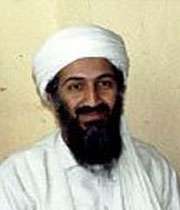Criticism of Osama bin Laden
Osama bin Muhammad bin 'Awad bin Laden (Arabic: أسامة بن محمد بن عوض بن لادن; 10 March 1957 – 1 May 2011),[1] the Salafi militant Islamist founder of al-Qaeda, responsible for the 9/11 attacks on New York City and The Pentagon,[2] has come under criticism from a number of sources. This article omits most of the criticism directed at his acts of terrorism, because that is discussed on his main page.
Non-Muslims and non-Salafi
Among the Western authors who have identified or alleged errors and inconsistencies in bin Laden's arguments is The Economist’s Mideast correspondent, Max Rodenbeck, writing in The New York Review of Books.
- He criticized bin Laden's contention that: "the US had no mentionable role" in "the collapse of the Soviet Union ... but rather the credit goes to God and the mujahidin in Afghanistan ...,"[3] when in fact the United States delivered $3 billion worth of arms and money to mujahideen between 1981 and 1989.[4]
- Bin Laden denounces democracy as a "religion of ignorance" that violates Islam by issuing man-made laws, but later compares the Western democracy of Spain favorably to the Muslim world - because "the ruler there is accountable." "Evidently, [bin Laden] has never heard theological justifications for democracy, based on the notion that the will of the people must necessarily reflect the will of an all-knowing God," Rodenbeck comments. It is worth noting that Spain was once under the rule of the Umayyad Caliphate.
- Rodenbeck asks why, if as bin Laden asserts, infidels are "attacking Muslims like people fight over a plate of food," planning to "enslave" Muslims or to "annihilate" Islam, they have not simply attacked Mecca.[5]
- "The idea that America "robs" Arabs of their oil will certainly be news to American consumers, as much as to the very wealthy citizens" of Muslim Gulf states like Kuwait.[6]
- Bin Laden "repeatedly" accuses the Christian West of having waged war on Islam "for 80 years," a period during which European imperialism was in retreat and the events he describes as the most "penetrating and brutal" acts of imperialism - Dutch conquest of the East Indies, the French invasion of Algeria in the 1830s, or Britain's crushing of the 1857 Indian Mutiny - happened outside the period.
- In 1997 he condemned the United States government for its hypocrisy in not labeling the bombing of Hiroshima as terrorism. In November 2001, he maintained that revenge killing of Americans was justified because he claimed that Islamic law allows believers to attack invaders even when the enemy uses human shields. "However, this classical position was originally intended as a legal justification for the accidental killings of civilians under very limited circumstances -- not as a basis for the intentional targeting of noncombatants."
- A few months later in a 2002 letter, he made no mention of this justification but claimed "that since the United States is a democracy, all citizens bear responsibility for its government's actions, and civilians are therefore fair targets."[7]
- But yet another critic points out that bin Laden contradicts this democracy-creates-responsibility position in another, more typical, Islamist description of Western democracy (specifically American democracy) as `the law of the rich and wealthy, who hold sway in the political parties.`[8]
Still other critics have pointed out that
- Bin Laden invokes democracy both as an example of the deceit and fraudulence of western political system — American law being "the law of the rich and wealthy, who hold sway in the political parties"[9] — and as the reason civilians are responsible for their government's actions and so can be lawfully punished by death.[10]
- claims "Muslims are starving to death" because "the United States is stealing their oil" by paying too little for it, but bases the claim of theft on the assumption that oil prices would continue to climb following the massive price increases of 1973 and 1974;[11]
- and claims that the high infant mortality rates in Iraq from American-supported economic sanctions were "the greatest slaughter of children that mankind has known", while praising the Taliban for making Afghanistan "the only Islamic country" in existence, though that regime also facilitated extremely high infant and young children mortality rates by expelling international aid groups.[12]
Osama bin Laden is also heavily criticised for orchestrating the September 11 attacks.
Family
On January 21, 2008, bin Laden's son Omar Osama bin Laden issued a public request to his father to stop killing civilians.[13]
See also
References
- ↑ "Wanted: Usama Bin Laden". Interpol. Retrieved 2006-05-15.
- ↑ Michael Scheuer, Through Our Enemies' Eyes, p. 110
- ↑ p.50, Messages to the World, 2005, quoting March 1997 interview with Peter Arnett
- ↑ Their Master's Voice, a review of Messages to the World: The Statements of Osama bin Laden
- ↑ p.50, Messages to the World, 2005, quoting March 1997 interview with Peter Arnett
- ↑ p.50, Messages to the World, 2005, quoting March 1997 interview with Peter Arnett
- ↑ nytimes.com "Becoming bin Laden," Review by NOAH FELDMAN, February 12, 2006
- ↑ Messages to the World: The Statements of Osama bin Laden, p.168, quoted in "Listening to Bin Laden" by S Shirazi, March 31, 2006
- ↑ Messages to the World, Statements of Osama bin Laden, Verso, 2005, p. 168
- ↑ Listening to Bin Laden by S Shirazi
- ↑ "The War against Islam," Stealing Muslim Oil
- ↑ The "War against Islam" Killing Muslim Children. Bin Laden, the US, Iraq and Afghanistan
- ↑ "Bin Laden's son to father: Change your ways", By Aneesh Raman, January 21, 2008, CNN.com
